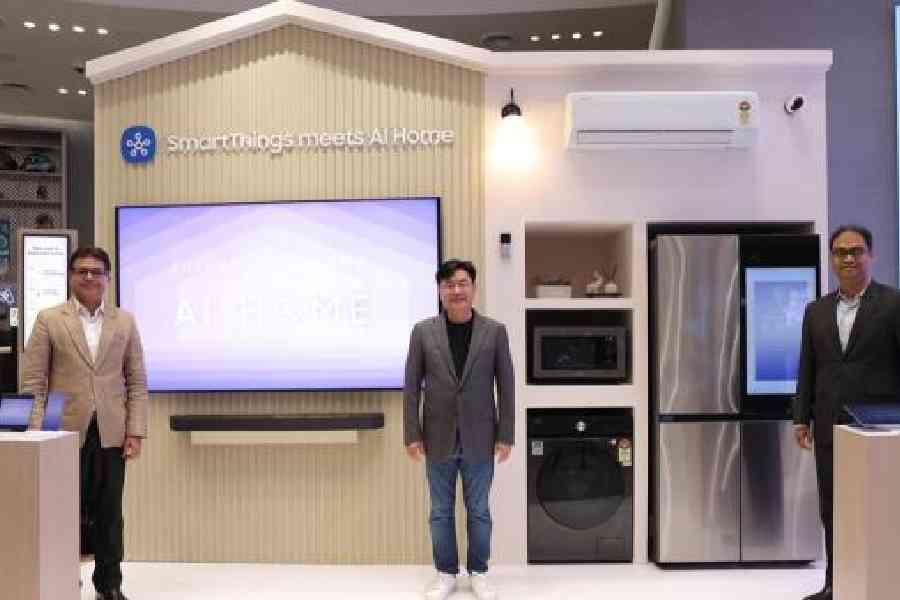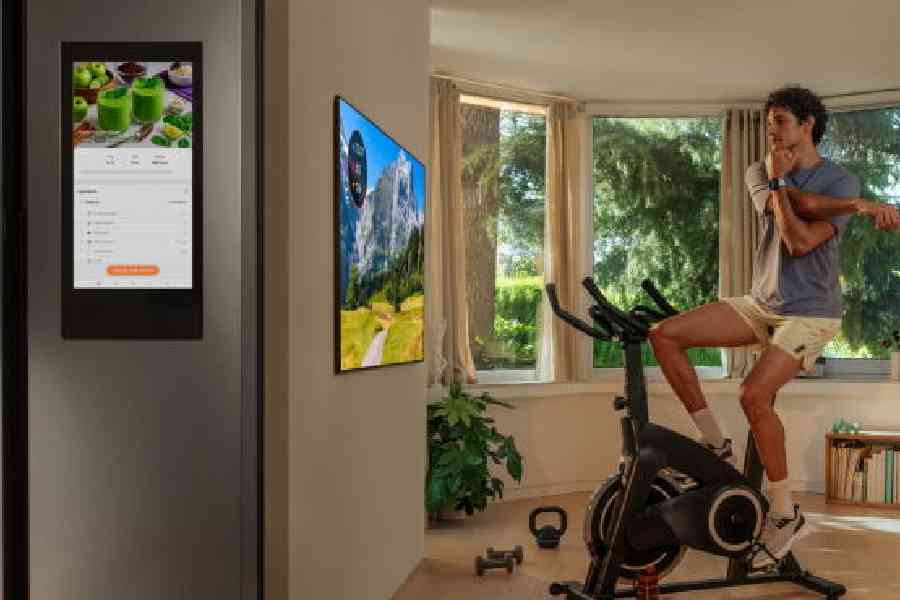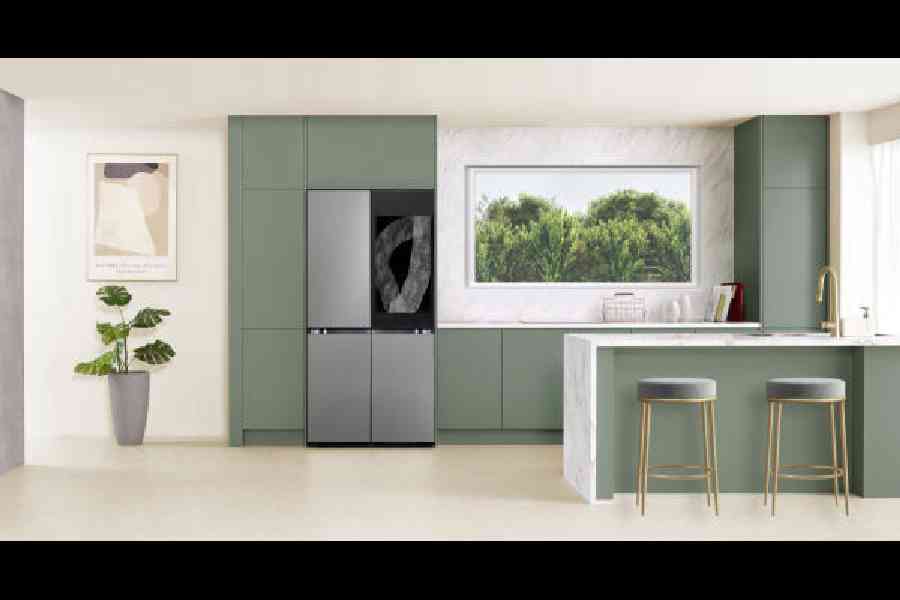Here’s how my usual sleep routine unfolds. Every couple of hours, I wake up to switch off the air conditioner because my wife gets chilly in her sleep. She wants the room to be constantly at 21 degrees Celsius. Here’s the routine in my daughter’s room. She sleeps like a baby, always enjoying 23 degrees Celsius. The difference? In one room, there is a Samsung air conditioner, while in the other, there is something from a rival company.
What if I switch it up? Say, a Samsung Galaxy Watch is strapped to my wrist while the AC in the room is also from Samsung, and both are connected via the SmartThings app. The watch can detect my sleep stage and, in turn, control the AC. Throw the television into the mix — it should remain off. All of this is possible with SmartThings and Samsung Galaxy Routines. How AI can be at the centre of our homes.
The South Korean electronics giant has slowly been building its gadget selection, and now everything has a bit of artificial intelligence in it. Last year, the company took an important step with Galaxy AI in its smartphones. Then came more AI in its other gadgets. Now, there is a bit of AI in almost everything from Samsung, helping devices interact efficiently.
The company has showcased its next step in its smart home dreams through ‘AI Home: Future Living, Now’. Samsung AI Home is a next-generation connected living ecosystem that unites appliances, devices, and services to deliver unmatched convenience, energy efficiency, and personalised experiences — all with security and privacy at the core.

Amit Kumar Jaiswal, vice-president, Software R&D, SRI-D; JB Park, president and CEO, Samsung Southwest Asia; Ghufran Alam, vice-president, Digital Appliances, SIEL
“Our journey started with Galaxy AI when we launched our AI-enabled phones in 2024. And then we moved into Bespoke AI. Then we have Vision AI, which is optimised television viewing and the sound system. It’s a kind of journey that we had in Galaxy AI, Vision AI, and also Bespoke AI. These run on independent devices. When you come home, all these devices are there together. We want them to talk to each other, making sure that your preferences are known to them. They are in the background,” Ghufran Alam, vice-president, Digital Appliances Business, SIEL, told t2oS.
He spoke about how AI is helping Samsung offer personalised service. “They also make sure that your data is safe and secure, whether it’s healthcare through Galaxy smartwatches or the sleep patterns that are getting recorded. Or consider the elderly who are not staying with their children. For example, if the elderly parents are elsewhere and there are fewer movements taking place over a certain period of time, maybe they are not turning up for lunch around their usual time, there can be a notification about that. Maybe you should give them a call. It’s a very personalised service through which we look at ease of use, care, and also (energy) saving, once you have enabled the feature in SmartThings. Once you turn on energy saving through SmartThings in one product, the same happens across the ecosystem products. And there is a high level of security, which is defense-grade,” said Alam.
Ambient intelligence
At the heart of this launch is Samsung’s Future Living vision, which has unlocked a world where intelligence is not confined to a single device but shared seamlessly across every screen, appliance, and service. AI Home embodies this vision through three foundational strengths — Samsung’s leadership in AI, the unmatched breadth of its device portfolio, and a trusted, secure ecosystem.
The bigger picture involves ambient intelligence in which the system learns continuously from user behaviour and environmental cues to automate comfort, care, energy savings, and security. From an AC that adapts as you rest, to a fridge that suggests meals based on your dietary goals, to SmartThings-enabled devices syncing effortlessly in the background — every interaction is enriched with contextual, human-centred intelligence.
“At Samsung, we are not just imagining the future of AI; with the integration of Galaxy AI, Vision AI, and Bespoke AI through our SmartThings ecosystem, we’re building it into people’s daily lives. With the launch of Samsung AI Home here, we are bringing Future Living into Indian homes — making everyday living more convenient, efficient, healthy, and safe. India is at the heart of this journey. Our three R&D centres in India are shaping exciting AI innovations here and taking them to the world,” said JB Park, president and CEO, Samsung Southwest Asia.
The technology, for example, helps save energy, which brings down the overall cost of running the household and is a way to protect the environment. “When we look at each application under SmartThings, the AI-driven energy saving mode is one of the most used services. It has a lot of use cases. It actually makes energy saving in each of the products much more tangible. It even shows you on a daily basis… the tracking. The amount of energy saved can vary, say from 30 per cent to 70 per cent, depending on what you are using, like a washing machine or the refrigerator or air conditioner,” said Alam.
Era of Quantum Computing
The other important part involves Samsung Knox, which is one of the most secure ways to protect user data. We already know how it helps secure data on every Samsung device.

With SmartThings Energy, users can schedule and charge appliances at optimal times
“But let’s say you have a collection of devices at home. This is where our Knox metrics algorithm kicks in, where all of them are also monitoring each other’s security. By any remote chance, if one of the devices gets compromised, the others immediately isolate it. Our Knox security is defense-grade. We have the highest Diamond-grade security rating from top external IoT agencies. There is more. Think of quantum computers. Let’s say these come into the picture a few years down the line. With amazing supercomputing coming into the picture, a lot of algorithms and encryptions today will be so easy to break. We have already integrated post-quantum cryptography technology into our Knox metrics. Even in the age of quantum computers, our Knox security, our AI home, will be protected,” said Amit Kumar Jaiswal, VP, software R&D, SRI-D. This is especially helpful if you are using multiple Samsung devices because it will ensure each device doesn’t just operate in a silo.
“SmartThings is our biggest IoT platform with 410 million registered users already on our global platform. In India, numbers are also very promising, and we are happy with the growth that is happening in India. We are building services on top of the devices. We call them lifestyle services. Consumers are enjoying the value they are enjoying. For example, energy service, home care service, family care service, tech care service, home monitor service, clothing care service… these are some examples which you can also see when you download the SmartThings app,” said Ridhi Chugh, general manager, India Consumer Experience, SIEL.
One of the most popular features in the Samsung universe is Routines, and there are plenty of YouTube videos about it. It can change the way you use Samsung devices.
“Routines is a new tab. And these routines are AI recommendations that you can create with a TV or, say, a washing machine. You can, say, create a morning routine or a night routine. You can create a routine when you leave home. You can create a routine for when you return home. So there is AI which is giving recommendations. Also, there is manual control. It’s the biggest IoT platform when you see the kinds of services and the features that it provides,” said Chugh.










